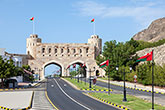African LNG exports to get boost from offshore projects
Published by Joseph Green,
Editor
LNG Industry,
According to the latest Reuters report, Cameroon plans to begin exporting LNG later this year using a newly designed offshore plant that analysts say could slash production costs and unlock African reserves not previously considered economically viable.
West and Central Africa's Gulf of Guinea has seen a wave of new oil and gas exploration, particularly since Tullow Oil discovered Ghana's huge Jubilee gas field in 2007. But the cost of pipelines and onshore liquefaction facilities means that relatively few gas finds have been developed.
A specialised vessel owned by Golar LNG will dock offshore Cameroon's Atlantic coast in the coming weeks for testing. It will liquefy natural gas produced in nearby offshore fields for shipment directly overseas. Russia's Gazprom has the rights to ship the gas to customers in Asia, Europe or South America.
In sub-Saharan Africa, Nigeria, Equatorial Guinea and Angola already export over 20 million tpy of LNG, mainly to Europe and Asia. But those kinds of onshore facilities, which require large refrigeration units and storage tanks that take up acres of land, can be prohibitively expensive.
The new offshore vessels will do the same job as the onshore facilities, albeit in smaller volumes, for a fraction of the cost in infrastructure.
Cameroon, Equatorial Guinea and Congo Republic are already developing four such offshore plants. Together they are expected to cost around US$6 billion, a price tag comparable to that of some single onshore facilities.
In Senegal, BP is also considering using similar technology to export newly-discovered gas in deep waters there.
The exact volumes produced by the new offshore projects is not yet clear. Cameroon's project, a joint venture between Golar, Perenco and Cameroon's state-run SNH, will produce 1.2 million tpy.
Together, the four planned offshore projects are unlikely to produce much more than 7 million tpy of LNG.
But small scale has its advantages. In a market already glutted by a 7.5% growth in supply last year, having the cheapest gas will help win customers. A smaller-scale plant could help keep costs down. Only one other plant like the one in Cameroon currently exists. It went online in Malaysia in March, and the market will be closely watching progress in Cameroon.
Read the article online at: https://www.lngindustry.com/liquefaction/31072017/african-lng-exports-to-get-boost-from-offshore-projects/
You might also like
Technip Energies awarded contract for Marsa LNG project in Oman
Technip Energies has been awarded an engineering, procurement, and construction contract of a liquefaction train for OQ and TotalEnergies’ Marsa LNG project.

